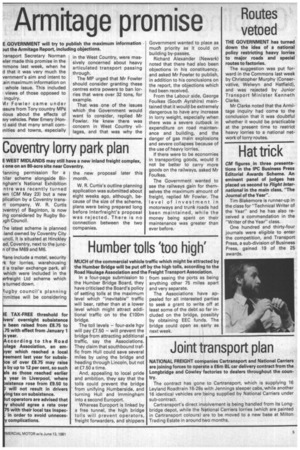Armitage promise
Page 7

If you've noticed an error in this article please click here to report it so we can fix it.
E GOVERNMENT will try to publish the maximum information aut the Armitage Report, including objections.
-ransport Secretary Norman uler made this promise in the -nmons last week, when he d that it was very much the vernment's aim and intent to :ain maximum information on whole issue. This included views of those opposed to
inquiry. • Inr: Fowler came under issure from Tory country MPS dous about the effects of ivy vehicles. Peter Emery {Hon-1) said that many small corninities and towns, especially in the West Country, were massively concerned about heavy articulated transport passing through.
The MP urged that Mr Fowler should consider granting these centres extra powers to ban lorries that were over 32 tons, for example.
That was one of the issues which the Government would want to consider, replied Mr Fowler. He knew there was concern in West Country villages, and that was why the Government wanted to place as much priority as it could on building by-passes.
Richard Alexander (Newark) noted that there had also been objections in his constituency, and asked Mr Fowler to publish, in addition to his conclusions on the report, the objections which had been received.
From the Labour side, George Foulkes (South Ayrshire) maintained that it would be extremely dangerous to have any increase in lorry weight, especially when there was a severe cutback in expenditure on road maintenance and building, and the danger of gas main explosions and severe collapses because of the use of heavy lorries.
If there were to be economies in transporting goods, would it not be better to carry more goods on the railways, asked Mr Foulkes.
The Government wanted to see the railways gain for themselves the maximum amount of freight, replied Mr Fowler. The level of investment in motorways and trunk roads had been maintained, while the money being spent on their maintenance was greater than ever before.












































































































































